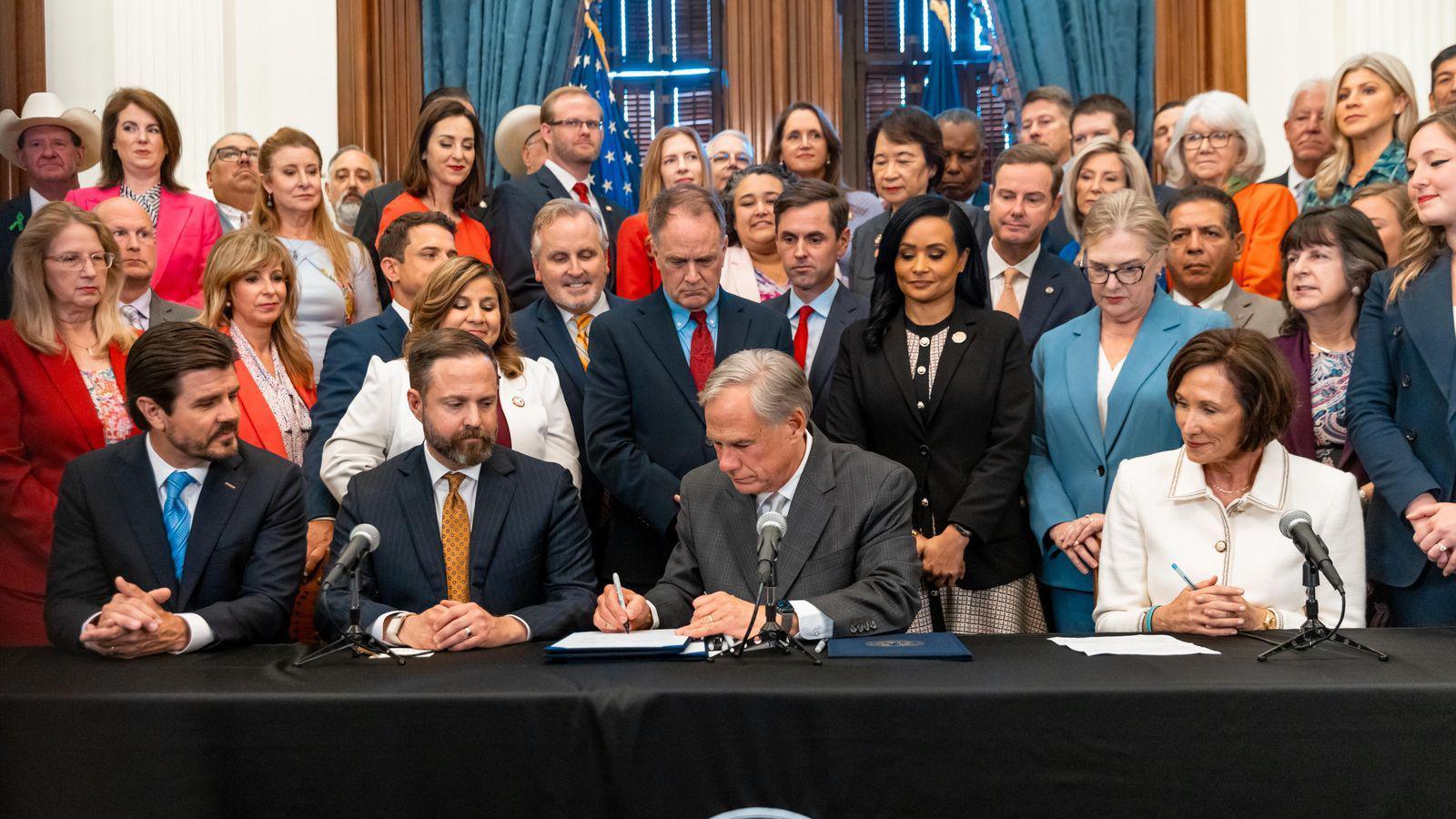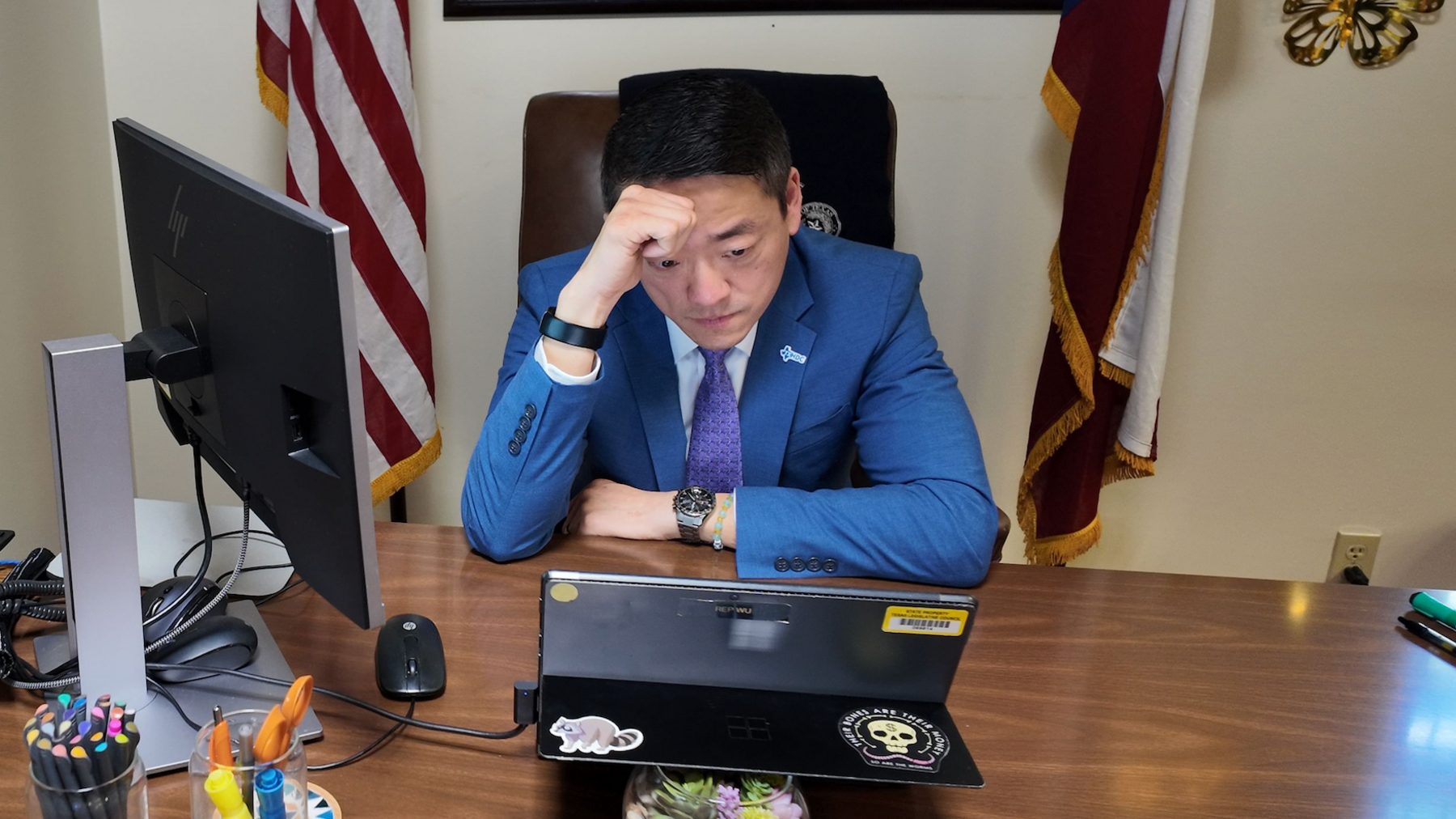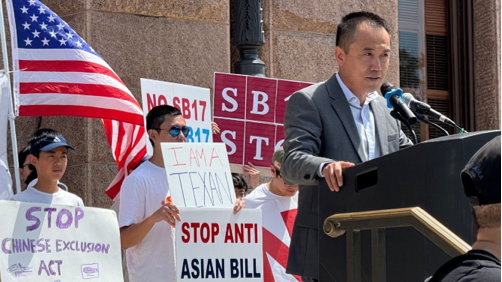National security or xenophobia? Texas restricts Chinese owning and renting property

A signing ceremony of Governor Greg Abbott took place on 26 August
- Published
Jason Yuan, a second-hand car shop owner, closes the hood of a vehicle after tightening the last nut on the battery terminal - a routine he is all too familiar with.
Texas has long felt like home for him, as a naturalised US citizen born in China. But a recently passed state law is shaking his belief in his chosen homeland.
Texas Senate Bill 17 of 2025, also known as SB 17, will take effect on 1 September, restricting people and companies from China, Iran, North Korea and Russia from purchasing and renting property.
Officials say the bill is to protect national security. But to people like Mr Yuan, it sends a discriminatory message - that people who look like him are not welcome in Texas.
"It is anti-Asian, anti-immigrant, and specifically against Chinese-Americans," said Texas Representative Gene Wu, a Democrat leading the fight against the bill.
The new law could harm businesses in Texas, Wu told the BBC. Companies that could bring millions of dollars of investment to the state are looking for options elsewhere.

Texas Representative Gene Wu has led the fight against the bill
Bill targets 'malignant influence'
SB 17 was proposed earlier this year and signed into law on 20 June by Governor Greg Abbott, who called it the "toughest ban in America" to keep away foreign "adversaries".
It prohibits certain individuals and organisations of countries designated as national security threats from acquiring property in Texas - including homes, commercial space and agricultural land. It also restricts the length of time for which they can rent property to less than one year.
China is the first country named in the legislation, which accuses Beijing of using "coercive, subversive, and malignant influence activities to weaken the United States" in its bid to surpass the US economically, militarily and politically.
Those who violate the law could face fines of more than $250,000 (£193,000) or jail terms.
US citizens and green card holders are exempt, and valid visa-holders will still be allowed to own one primary residence. But opponents say regardless of the carve-outs, the bill is discriminatory in nature, and anyone deemed to look Chinese could be subject to unfair scrutiny.
In July, the Chinese American Legal Defense Alliance (Calda), a non-profit organisation, filed a lawsuit on behalf of three visa-holders from China, arguing that the law was unconstitutional.
The judge later dismissed the case, siding with the state attorney general who said the plaintiffs - who are student-visa and work-visa holders living in Texas - would not be personally affected by the law.
It therefore appears that the three plaintiffs are spared for now. But, for the wider group of visa-holders from the four countries, the lack of clear interpretation of the legal clauses still stokes uncertainty. Calda says it has filed an appeal.
'The Chinese Exclusion Act of 2025'
Chinese nationals are the largest group affected by the new law. At least 120,000 people who were born in mainland China were living in Texas as of 2023.
Qinlin Li, a recent graduate of Texas A&M University and a plaintiff of the lawsuit filed against SB 17, said she was shocked when she first learned about the bill.
"If there's no human rights, then we [are] back to like 150 years ago, we were like the railroad labourers," Ms Li said.
Ms Li lived in a rented apartment nestled in a quiet residential area in a suburb of Austin. Busy with her work and the lawsuit, she did not have time to search for a new apartment that could meet her needs until two weeks before her lease was due to expire.
She was in the middle of moving when the lawsuit was dismissed. Though the court ruling said she was not affected by the law, she said the entire process had taken a toll on her mental health.
"I think it's going to block people from studying here and working here because it's a lot of trouble just to think about it," Ms Li said.
Jason Yuan has devoted his time outside his car shop work to be a community activist. Before the bill passed, he led rallies outside the Texas capital and testified at a public hearing, telling the committee that the new land bill should be called "the Chinese Exclusion Act of 2025".
In 1882, the Chinese Exclusion Act, a law fuelled by anti-Chinese sentiment, was passed. The controversial law barred immigration of Chinese labourers into the US.

Jason Yuan giving speech at the anti-SB 17 rally outside state capitol building in Austin in May
"Banning home ownership from folks just like me based on their country of origin, that is discriminatory in nature," Mr Yuan, the car shop owner, told the BBC.
Mr Yuan was concerned about the future for his two children - and when he spoke at a recent rally, his 13-year-old son stood behind him.
"I told everybody this is all worth it," Mr Yuan said. "In the future, I would tell my kids when you face some discrimination, when somebody picks on you, this is a way to push back."
Chinese companies consider looking elsewhere
As a small business owner, Mr Yuan also worries about the bill's financial impact as at least one third of his clients are Chinese immigrants.
"It's an ecosystem that the business owners of the Chinese community depend on," he said.
As well as small businesses, transnational companies from China could be directly hit by the bill.
Between 2011 and 2021, 34 Chinese companies recorded 38 investment projects, $2.7bn in capital investment and 4,682 jobs in Texas, according to a report by state officials.
Some Chinese companies are now reportedly seeking alternatives to Texas.
Nancy Lin, a commercial estate agent based in Dallas, told the BBC that several prospective Chinese clients she has spoken to are pausing their investment plans, including some in the electric vehicle and solar panel sectors.
"If this issue can't be resolved, I think it will be more difficult for Chinese companies to enter Texas. As for those that already have existing leases, they can't renew them. If they do, it can only be for no more than one year."
The right to own land has been a struggle for Chinese-Americans, dating back over a century.
A previous alien land law in Texas, which restricted non-US citizens from purchasing land, was in force until 1965. It was deemed to be "unreasonable and discriminatory" and against "economic development".
Was project near airbase a threat?
Abbott says his top priority is the safety and security of Texans.
Asked for comment by the BBC, his office referred to previous statements on the matter, including a press release that said "hostile foreign adversaries", including China, "must not be allowed to own land in Texas".
Chuck DeVore, from a conservative think tank Texas Public Policy Foundation, was among those who spoke up in favour of the bill - highlighting the need to "keep hostile regimes away from our military bases, farmland, and infrastructure, like Laughlin Air Force Base in Del Rio, Texas, or the ranches feeding our state".
The legislative effort was prompted in part by Chinese businessman Sun Guangxin's controversial purchase of 140,000 acres land in Texas for a wind farm between 2016 and 2018, including land near Laughlin Air Force Base.
Although initially approved by the Committee on Foreign Investment in the United States (CFIUS), Texas passed a law in 2021 prohibiting agreements with certain foreign-owned companies in "critical infrastructure", and Mr Sun's project was thwarted.
Texas Senator John Cornyn in 2024 said that as a member of the Chinese Communist Party (CCP) and a former senior leader in the Chinese military, Sun likely had other concerning surveillance plans on behalf of the Chinese government.
Mr Sun hit back at such claims. A 2024 lawsuit filed by one of his business subsidiaries highlighted that US officials had taken mitigation and cleared the project from national security concerns.
A survey conducted by Center for Strategic and International Studies, a Washington-based think tank, gathered 224 espionage cases against the US from China from 2000-2023 from open sources.
CCP-related threats to the US have grown in recent years, national security experts have suggested.
"The risk is real," Holden Triplett, former head of the FBI office in Beijing, told the BBC.
"Targeting the US at the sub-national level has increasingly become a trend in intelligence. The individuals and groups at that level tend to be less aware of the risks and more likely to establish relationships," Mr Triplett said.
But Patrick Toomey, from the American Civil Liberties Union Foundation (ACLU), said that in the case of SB 17, some officials were wrongly equating Chinese people with the Chinese government.
"There is no evidence that harm to national security has resulted from Chinese people owning or leasing residential properties in Texas," he said.
Experts also question the necessity of Texas's new law from an regulatory standpoint. It was preferable for federal government to handle such matters to avoid overlapping jurisdictions, said Sarah Bauerle Danzman, from the Atlantic Council think tank.
A national trend
SB 17 is not the first bill of its kind in the US.
Twenty-six states, most of them Republican-controlled, have passed 50 bills that restrict foreign property ownership targeting China since 2021, according to Committee of 100, a Chinese-American non-governmental organisation.
Most of the state laws were passed since 2023, the same year that a Chinese spy balloon flew across North American airspace, in an incident that marked a new low for US-China ties.
The Trump administration has also said it plans to ban Chinese nationals from buying farmland in the US.
"Texas's law should sound alarm bells," said Mr Toomey, adding that the legislation weaponised false claims of national security against Asian immigrants and other communities.
Mr Yuan believes that if Chinese-Americans do not put up a fight, the new law in Texas could lead to similar bills being passed in other states.
Ohio, for example, is considering a ban against "adversarial countries", but with stricter scope that could include green card holders as well. Activists have been rallying against it.
"They're trying to rewrite the rules of democracy," says Mr Yuan, "but there is still a chance we could change the course.
"Otherwise, the US will become much more like China."